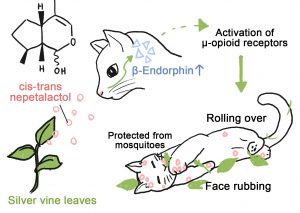Catnip is a plant that can bring about a euphoric state and cause most cats to act unusually as if they are drunk. If you own a cat, you may have used catnip products and witnessed your cat rolling, flipping, and rubbing. Some cats even zone out. The responses to catnip are also observed in other felids such as lions and bobcats.
“For cats, catnip may be a recreational drug but it’s totally harmless. […] After about 10 minutes, the cats come back down to Earth” (Wild At Heart, BBC Earth)

Credit: Wild At Heart | BBC Earth
Why do cats behave in this way?
Since the first feline response was reported by a British botanist back in 1759, this behaviour remained mysterious for a long time. It was generally thought that the responses were purely driven by the euphoric experience. However, in January 2021, a team of scientists from multiple universities in Japan and The University of Liverpool found that the responses allow cats to protect themselves from mosquito bites.
The team found that in the silver vine plant (which has the same effects as catnip), the significant component that induces the characteristic behaviour is called nepetalactol. The team also found that it has mosquito repellent activity. In catnip, the corresponding chemical is called nepetalactone and has similar properties.
When cats sniff these chemicals, it stimulates the brain system u-opioid. In humans, this system controls the rewarding effects. Researchers confirmed that the stimulation induces cats to rub their bodies and face against the chemical. This rubbing and rolling behaviour transfer the chemical onto their fur, allowing the cat to gain a chemical defence against mosquitoes.

The neurophysiological and functional significance of silver vine response in cats.
Image Credit: Chie Nakayama adapted from Uenoyama, Reiko, et al. doi:10.1126/sciadv.abd9135.
Their findings confirmed that the euphoric experience drove the behaviour. At the same time, it showed that what seemed like a crazy behaviour was surprisingly a functional one. The research sheds light on developing new mosquito repellents for humans in the hope of gaining protection from the transmission of malaria and yellow fever.
– Chie Nakayama
